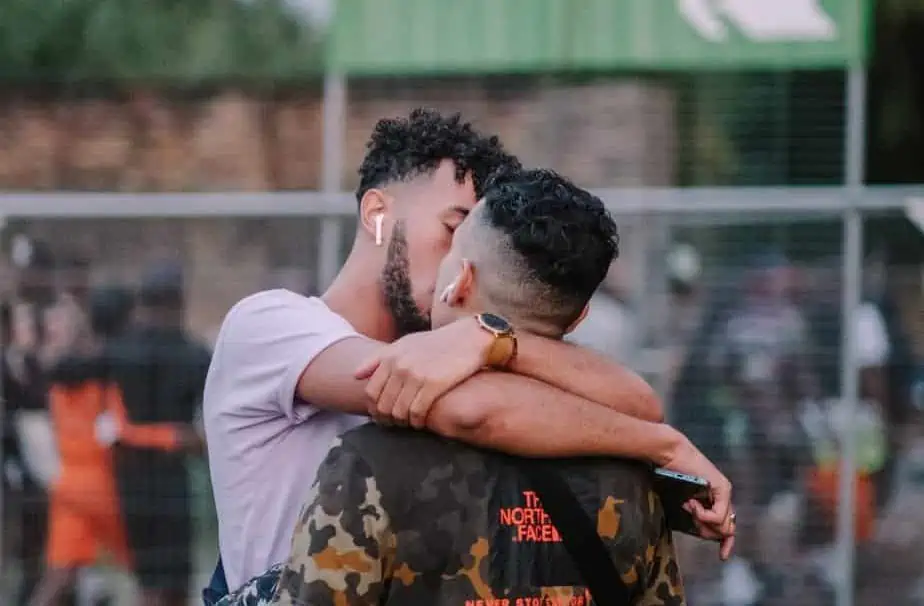LGBTQIA+ culture includes the highs of pride celebrations and marriage equality, but also lows such as family dysfunction, club culture, internalized queerphobia, and religious trauma that can shatter someone’s world. These difficulties can weigh on someone, leaving them feeling misunderstood or alone and heavily affecting their mental health. Whether it’s a memoir on drug addiction as a gay, black man or a graphic novel about French lesbians, these are the best LGBTQ+ books for learning about the complexities of queerness from experts and community members.
LGBTQ+ Memoirs
Untamed
By Glennon Doyle
Untamed is an emotionally liberating book for any woman seeking a pathway to self-love and personal growth. Glennon Doyle’s third memoir chronicles her divorce from her husband while she rejects conformity, challenges gender norms, and falls in love with international soccer star Abby Wambach. As she navigates her commitment to her family and her truer self, Doyle comes to terms with what an authentically queer life can look like.
The Politics of Crystal Meth
By Kenneth Cimino
This book first addresses the challenges gay and bisexual men face during addiction: social stigma, HIV-related issues, and political oppression. Kenneth Cimino follows with ten stories of queer men who experienced methamphetamine abuse and sought recovery, answering the common question of those seeking treatment: “Am I an addict?” Cimono’s variety of motivating stories show how addiction is not a homogenous struggle and that any gay man may have this experience.
Redefining Realness
By Janet Mock
Janet Mock’s New York Times bestseller is an unapologetic piece about growing up as a multiracial trans woman in America. Her book gained notoriety for its honest portrayal of the challenges that many LGBTQ+ kids face: drug addiction, impoverished families, racial injustices, and dehumanization. Mock is an important and unchallenged leader in the transgender community, and her first book is a testament of her powerful, accessible reach.
Over the Top
By Jonathan Van Ness
Before Netflix’s hit show Queer Eye casted Jonathan Van Ness as its grooming and self-care expert, he was a young queer kid growing up in the Midwest, whom people called Jack and watched tumble, dance, and cheer. In his memoir, he shows a side of his life very different from what’s on TV, shining light on troubling topics such as the street harassment he faces and his HIV diagnosis at 25. It is Van Ness’ frank voice, which has captivated millions of the show’s fans, that makes this book a must-read.
How We Fight for Our Lives
By Saeed Jones
Saeed Jones writes vibrantly about his revelations as a Black, queer man in this award-winning coming-of-age novel. Jones’ beautiful prose consists of a series of vignettes on the pursuit of sex, dating white men, and trying to navigate a dying relationship with his mother. This poetic memoir, a short read, is packed with emotionally raw honesty about experiencing queerness as a black man.
Leaving the Rest
By Leslie L. Smith
A businessman, an erotic writer, and a Parisian expat are just some of the many voices in this book by Leslie L. Smith. In Leaving the Rest, gay men from diverse walks of life share candidly about their personal experiences with alcoholism and recovery, touching upon how a twelve-step program played a role in shaping each of their healing. With wide open, raw honesty, the book unveils the highs and lows of these men’s journeys, of the intertwining of homosexuality, addiction, and sobriety.
Dry
By Augusten Burroughs
This self-reflective autobiography follows Augusten Burrough’s career in advertising as a functioning alcoholic, admitting to the horrible truths of being unable to stop until intervention. This book speaks to the normalization of alcoholism in Burroughs’ Manhattan lifestyle and addresses the many obstacles on the path to sobriety.
Broken Horses
By Brandi Carlile
Singer-songwriter and Grammy winner Brandi Carlile writes a candid reflection on her gay crushes, impoverished childhood, and living with an alcoholic father. This book gives readers new information about her unique life with outlandish stories about religious trauma, familial drama, and even a pet horse. Brandi Carlile triumphantly rejects the status quo and writes with an emotional depth on her lesbianism and her tenacity.
A Doctor’s Confession
By Michael Fredericks, MD with Susan M. Silver
A charismatic storyteller, Michel Fredericks fictionalizes his experience with numerous substance addictions into a riveting story of a gay doctor rebuilding his life in his pursuit of sobriety. Fredericks’ voice is friendly and familiar, gently guiding a story of humorous anecdotes and rich detail about his young adulthood. This book is a great read for anyone struggling to overcome addiction in the gay community.
Staying Strong
By Demi Lovato
Demi Lovato’s career as a singer and TV personality put them in public scrutiny. Despite all the uninvited criticism, they continue to be an advocate for mental health and spiritual wellbeing. Lovato’s powerful mantas and daily affirmations have helped guide them through addiction and depression and into recovery. In this book, Lovato shares the daily affirmations she meditates on every morning in her pursuit of mindfulness, self-reflection, and healing.
LGBTQ+ Fiction and Poetry
Rubyfruit Jungle
By Rita Mae Brown
In this fiercely feminist coming-of-age novel, protagonist Molly Bolt evolves from her preteen years into young adulthood, challenging her family’s expectations for her as she attends film school and rejects marriage. Rubyfruit Jungle explores Molly’s numerous relationships with women, something Molly seems to attract with her brilliance and passion. Lesbianism is explored through this witty novel from 1973 that subverts the expectations of traditional American values.
Junky
By William Borroughs
William Borroughs’ describes drug addiction as “a way of life,” fictionizing his own experience with addiction into Bill Lee, a protagonist in 1950s America. Using a variety of drugs in social experiences with other men, Bill finds himself in a dramatic daze of addiction, seeking fixes from hookups and strangers. Originally published in 1952, this semi-autobiographical novel is a compelling and historically significant look into the life of a midcentury heroin addict.
Blue Is the Warmest Color
By Julie Maroh
A lesbian cult classic, this full-color graphic novel follows Clementine, a girl filled with rebellion and curiosity, as she explores her sexuality in her French town. She meets Emma at a gay bar and immediately falls in love, forming a deep and passionate intimacy with her. The novel follows Clementine and Emma’s relationship through the trials of homelessness, homophobia, and Clementine’s troubling addiction to prescription pills.
LGBTQ+ Non-fiction
Beyond the Gender Binary
By Alok Vaid-Menon
Deconstructing the gender binary, Alok Vaid-Menon shows how gender is not black and white, but full of vibrant colors. As a gender non-conforming artist known for their unapologetic self-acceptance, Vaid-Menon uses academic theory and queer history in their easy-to-follow language to inform readers on gender expression and trans identity.
Gay Men and Substance Abuse
By Michael Shelton, M.S., CAC
The unique experiences of gay men facing addiction recovery is complicated by various social aspects—unaccepting families, club culture, traumatic relationships, and stressful social change. This book gives a perspective that is different from the traditional treatment systems that cater to heterosexual relationships and miss the fundamentals of the queer experience.
Queers in History
By Keith Stern
This detailed almanac on LGBTQ+ historical figures and modern-day personalities encapsulates the variety of queer experiences, from homosexual samurais to bisexual Hollywood actresses. Over six-hundred pages cater to all identities in the LGBTQ+ community and pay attention to prominent moments of queer history. Sir Ian McKellen writes the foreword.
The Velvet Rage
By Alan Downs, Ph.D.
The Velvet Rage is an enlightening work on the psychological consequences of internalized homophobia. The shame of queer identity can lead some gay and bisexual men to use substances as a coping mechanism. This nuanced examination of mental illness and addiction in the gay community helps queer men find solace in the journey to an authentic self.
Addiction and Recovery in Gay and Lesbians Persons
By Robert J Kus, Ph.D
Mental health professionals who are seeking research studies that focus on LGBTQ+ issues will find use in this book’s in-depth analysis on topics critical to addiction recovery conversations with clients. Writings include such topics as spirituality, the distinctive needs of rural clients, and homophobia as it relates to recovery in the LGBTQ+ community.
Life Isn’t Binary
By Alex Iantaffi and Meg-John Barker
Addressing both sexuality and gender identity, Alex Iantaffi and Meg-Jon Barker write with comprehensive language that brings readers of all backgrounds to truly challenge binary thinking. Using Reflective Points throughout the book to guide readers into deeper thinking about their own experiences and gender identity, this book is an excellent guide to understanding transgender issues with a twenty-first century mindset.
Cruise Control
By Robert Weiss
The battle of sex addiction for gay men is often overlooked because of cultural norms and stereotypes, making recovery less accessible. Even though queer men are not more likely to experience sex addiction than straight men, they are more susceptible to societal issues that hold them back from getting the treatment they need. This is an excellent resource on the difficult experience of sex addiction within the gay community.
If you or a loved one is struggling with addiction, Mountainside can help.
Click here or call (888) 833-4676 to speak with one of our addiction treatment experts.

 By
By 






